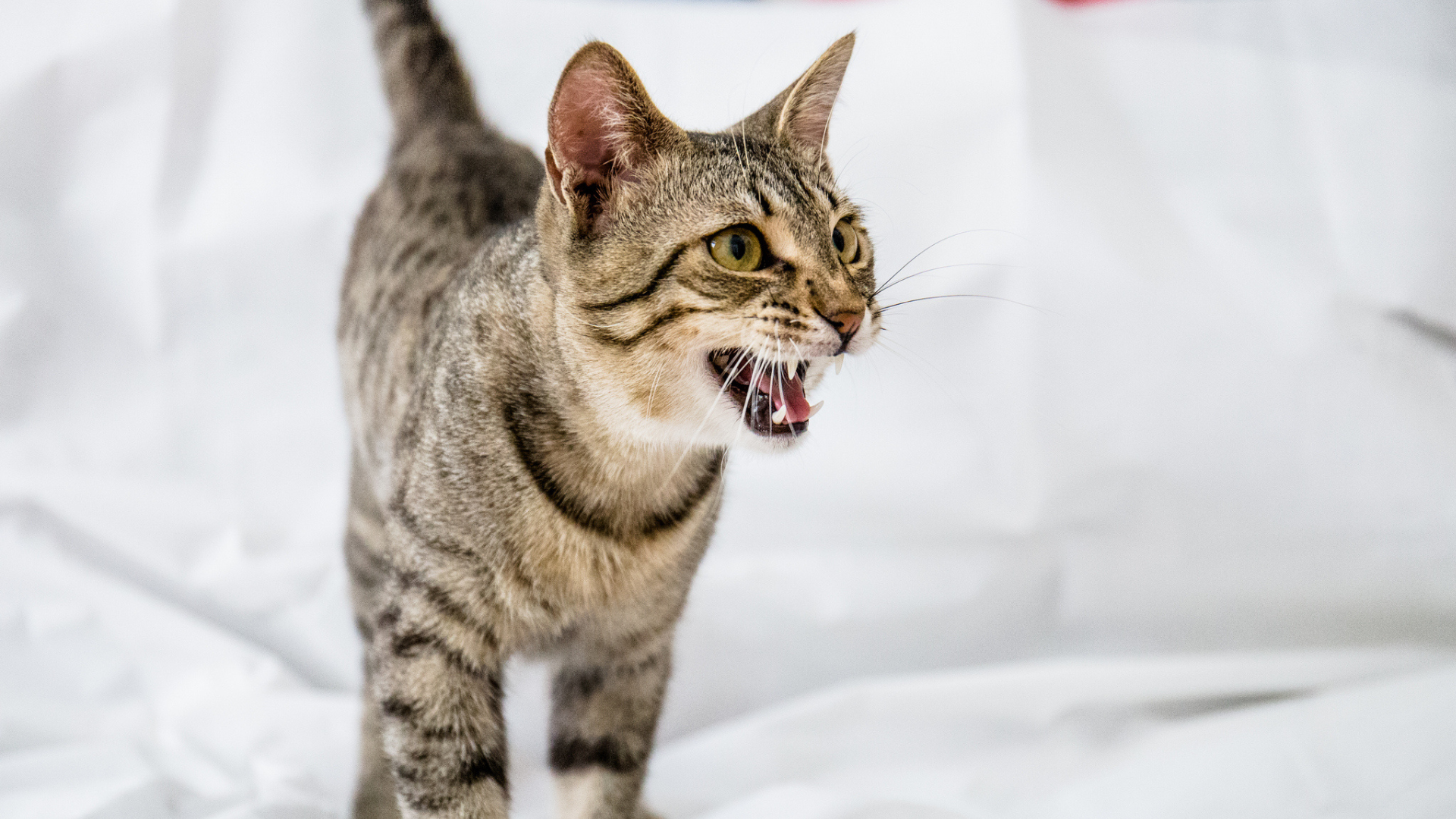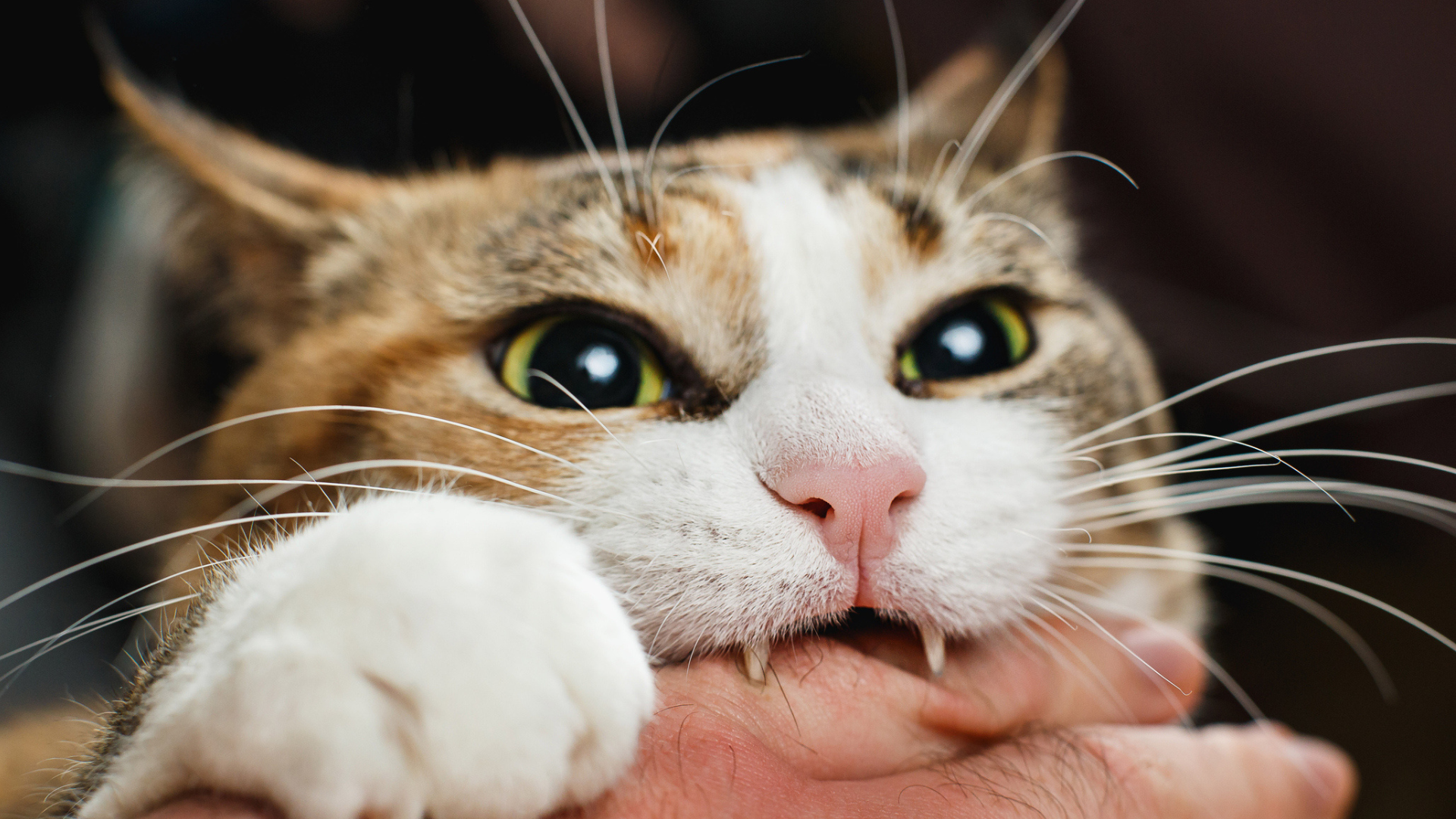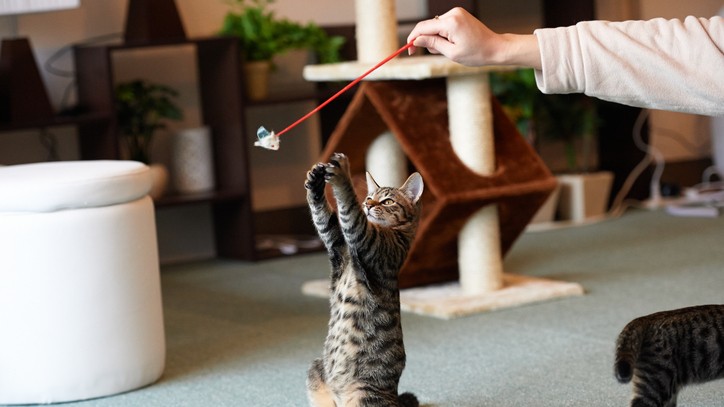Why does my cat get aggressive at night? Vet reveals the answer and what to do about it
Wondering, ‘Why does my cat get aggressive at night?’ We asked a vet for her expert advice.

Why does my cat get aggressive at night? If you’re a cat parent, then you’ve probably asked yourself this question at least once. Whether your fur baby loves attacking your feet under the covers or pounces at the slightest bit of movement – it’s the last thing you want when you’re trying to drift off.
We love playing with our cats, but there’s a time and a place – and our bedtime certainly isn’t it! There are various reasons why your cat might do this, which expert vet Dr. Catherine Barnette has explained below. Once you understand the reason for this behavior, it will make it easier for you to find a solution and get to the root of the problem.
The good news is that there are a few things you can do about it, like tiring your cat out during the day using the best cat toys. Below, Dr Barnette has explained her top tips for tackling this tricky problem.
Why does my cat get aggressive at night?
1. Evening hunting is a natural characteristic of cats
Cats are natural-born hunters. If you have ever owned an outdoor cat that left bird and rodent “gifts” on your doorstep, you certainly understand the truth of this statement! Even indoor cats love to hunt, though. Those small fuzzy mice toys that you see in pet stores are very popular, providing many cats with seemingly-endless entertainment.
Not only do cats love to hunt, they love to hunt in the evenings. While you’re likely familiar with the term nocturnal (active at night), cats are what is called “crepuscular.” This means that they are most active around dawn and dusk. Crepuscular animals experience brief bursts of activities followed by prolonged periods of rests, with their biggest bursts of activity occurring around dawn and dusk.
You may be tortured by their large energy bursts around sunset, especially during the summer when sunset falls close to your bedtime, or you may be woken up during their brief energy bursts in the middle of the night. Either way, the cat’s natural schedule lends itself to disrupting human sleep.
Get the best advice, tips and top tech for your beloved Pets

2. Human play methods tend to exacerbate cats’ natural tendencies
While your cat’s genetics play a significant role in evening play behavior, the actions that you and your family members took when your cat was younger also have an influence. In many families, hands are often used as a play toy for young kittens. If there isn’t one of the best interactive cat toys easily available, you may encourage your kitten to bat at your hand or chase it around.
As your cat grows older and her scratches and bites become more problematic, you may have switched (like many owners do) from playing directly with your hands to putting your hands under a blanket or bedspread. This allowed you to move your hands around and have your cat chase them, with less risk of injury to you.
Unfortunately, this sort of play has unintended consequences! Once you have encouraged your cat to play with moving objects under a blanket, your cat will see your hands and feet moving under your bedspread as an open invitation to play. When you roll over in bed and your feet move under the covers, your cat has no way of knowing that you are not interested in playtime. For more information, take a look at “How to play with a cat”.
How do I stop my cat being aggressive at night?
1. Tire your cat out during daylight hours
If your cat is like most indoor cats, she probably spends the majority of her day lounging on the couch or curled up on a windowsill while you are working, running your kids around, or taking care of household chores. Given this lazy feline lifestyle, it’s no wonder that she is then full of energy in the evenings! Also, it is only natural for your cat to crave your interaction and attention in the evening, after a full day without your attention as you dealt with other matters.
In order to help your cat rest at night, you need to interact with her and tire her out during the day. This may require some creativity, in order to determine which types of toys your cat prefers. There are a variety of toys available to facilitate play between you and your cat, such as the best laser toys for cats. See which types of toys your cat prefers, then use these toys at scheduled times of the day. This ensures that you won’t forget your cat’s playtime, while also giving your cat the benefit of a predictable schedule.
When you are away from home and unable to interact with your cat, there are still a number of ways that you can increase her activity. Consider feeding some or all of your cat’s meals using a best cat puzzle feeder you can find. Using this toy, or other similar puzzle feeders, can convert a boring mealtime routine to a fun activity. Place your cat’s morning meal within these small feeders when you leave for work and she will expend a good bit of energy trying to remove the food bites over the next several hours.

2. Create an evening routine
While you may think that bedtime routines are only for humans, they can also be helpful for pets. Just like we enjoy a set routine to help us wind down, our cats can acclimate to the same thing as cue that it is time for rest.
Begin your routine about an hour and a half before bedtime. First, have one last play session with your cat. This gives your cat a final opportunity to get rid of any excess pent-up energy from the day. Next, feed your cat a meal. Just like humans, cats with a full belly are more likely to want to rest. This evening meal can be fed in a puzzle feeder or the best cat food bowl.
Right before you go to bed, spend some time with your cat, providing your undivided attention. Don’t make this a high-energy play session; you don’t want your cat to become more fired up just before bed! Instead, try to encourage your cat to enjoy some cuddles, grooming, or other low-key interaction.
Finally, crawl in bed and relax. If your cat begins to show aggressive behavior, do your best to ignore it. While it’s tempting to try to reach down and push your cat away, or to try to move your foot away from your cat, all of this looks to your cat like you are returning their play gestures. Do your best to lie perfectly still until your cat loses interest and walks away.
Feliway MultiCat 30 Day Starter Kit Calming Diffuser for Cats
Does your cat find it hard to relax at home? If the answer is yes, then it’s worth trying out a plug-in diffuser. This one mimics the natural pheromones of a mother, which will help your cat to feel calm and safe. It’s vet-recommended and according to the brand, you’ll start to see results in just seven days.
3. Consistency is key when addressing behavior concerns
If you have found yourself wondering “why does my cat get aggressive at night?,” remember that there are things you can do to help decrease these aggressive tendencies! These feline behaviors are entirely natural, but you can overcome them by increasing your cat’s daily activity level and implementing a good bedtime routine for your cat. As long as you are consistent and avoid the temptation to react to evening aggressive play, you should begin to see improvement within a few days to weeks of implementing this routine.
You might also find helpful: Why does my cat scratch the wall? and Why won’t my cat sleep? Three reasons why they can't nod off.
Dr. Barnette is a graduate of the University of Florida, where she received both her B.S. in Zoology and her Doctor of Veterinary Medicine (DVM). She has 15 years of clinical experience as a small animal veterinarian, treating dogs, cats, and occasional exotic patients. She now works as a freelance veterinary writer, creating educational content for veterinarians, veterinary team members, and dedicated pet owners. Dr. Barnette lives in southwest Florida with her husband and daughter (plus two cats, a dog, and a rescued dove!) and enjoys kayaking, biking, and hiking. Learn more about Dr. Barnette at www.linkedin.com/in/catherinebarnette.
- Megan MilsteadStaff Writer


